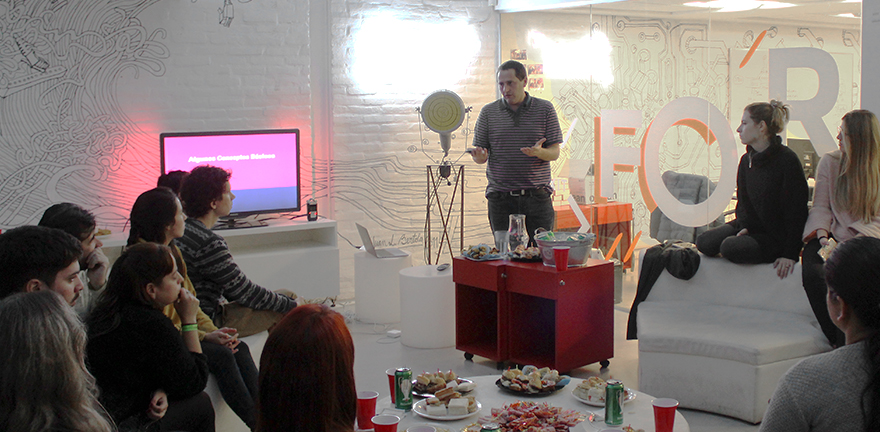Hand in hand with Bitgenia, an ally company of Flux IT, another edition of the cycle was experienced in the offices of Flux IT CABA (Ciudad Autónoma de Buenos Aires), in which Germán Biagioli, CIO of the company, introduced fluxers and guests from the community to the world of genomics and its impact on the medical clinic.
The meeting began after 5:30 PM, with a brief review of the company’s history and a recap of the key concepts to understand the value of genomic information as a tool to improve health care and quality of life.
Bitgenia was born in 2015 as a spin-off of Flux IT, in conjunction with the Structural Bioinformatics Group (Grupo de Bioinformática Estructural, BSG) of the Faculty of Exact and Natural Sciences of the University of Buenos Aires, being one of the pioneer bioinformatics companies in Argentina, dedicated to providing analysis and interpretation services on genomic data.
“The context is a paradigm shift in the field of health in everything related to the prevention, care, and treatment of diseases, mainly since 2003, when the first version of the Human Genome was published. The other opportunity is that the human body begins to be seen as a source of a large amount of data (Big Data), added to the fact that sequencing techniques advance, and sequencing costs go down.”
The talk focused on bioinformatics as a translational discipline that seeks to transfer research and genomic information to the clinical setting, generating value for doctors and patients:
“The challenge is understanding how to efficiently make information technology work a reality in the medical clinic. We receive the raw data, process and enrich it with information from different databases, and interpret it. The result of that interpretation is what we call new knowledge, and that report is what goes to the doctor.”


The utility and impact of this new knowledge acquired through the analysis of a patient’s genetic information becomes tangible in different ways:
“Many times already having a diagnosis is of enormous value. Other times, a variant is reached that the doctor can use. Not to mention the value for the field of research. The universe of applications is huge.”
To close, the expert stressed the importance of understanding bioinformatics as a tool with a lot of growth potential, through which computer scientists can begin to enter the field of health, working with biologists, biotechnologists, doctors, and geneticists.
“You have to be prepared to interact with different profiles and work as a team. The comforting thing is knowing that a person, from his basic education, can add a lot of value to a science. Bioinformatics is an example of how valuable it is to work multidisciplinarily.”
The meet-up, colored by a permanent exchange with the audience, closed with an after office sponsored by Flux IT.